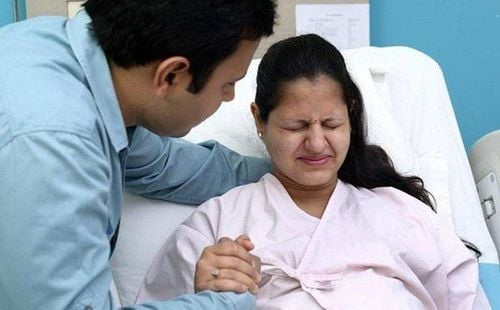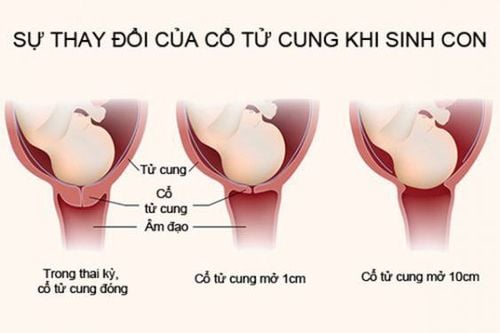This is an automatically translated article.
Postpartum women with amniotic fluid embolism is one of the rare but extremely dangerous obstetric emergencies that can cause respiratory failure, acute circulatory failure and rapid death for the mother.
1. What is amniotic fluid embolism?
Amniotic fluid embolism is an obstetric complication that represents the infiltration of amniotic fluid by fetal cells, hair, or other fetal tissue into the maternal circulation and causing an allergic reaction. Pregnant women face a high risk of death from amniotic fluid embolism.
Although very rare, amniotic fluid embolism has the potential to have serious consequences that are terrifying for both pregnant women and those working in the obstetrics profession. According to statistics, most women with amniotic fluid embolism die within the first hour, about 85% of women survive but have neurological sequelae later.
According to specialists, amniotic fluid embolism will occur when there are 3 following conditions: The mother has ruptured membranes, the cervix and the pressure of the uterus is higher than the mother's venous pressure or varicose veins of the uterus. In addition, a number of factors increase the risk of amniotic fluid embolism, including: Uterine overdistention, preterm placental abruption, trauma, stillbirth, multiple births, oxytocin use during labor, and maternal age.
2. Warning signs of amniotic fluid embolism

Thuyên tắc ối ở sản phụ có thể xảy ra trước, trong và ngay sau khi sinh
Amniotic fluid embolism in pregnant women can occur before, during and immediately after delivery. Abortion, or abdominal trauma, or amniotic fluid infusion can also cause amniotic fluid embolism.
Usually, complications of amniotic fluid embolism often occur in the last stage of labor, causing the mother to have sudden shortness of breath, pale skin, low blood pressure, pulmonary edema, and neurological manifestations such as loss of blood pressure. consciousness, confusion, coma, convulsions. Women with amniotic fluid embolism will go through 2 stages:
Stage 1: According to statistics, up to 80% of women with amniotic fluid embolism have cardiopulmonary arrest within the first minutes. Stage 2: Despite the fact that many women will not survive stage 1. However, there are also about 50% pass stage 1 when amniotic fluid is blocked and will enter stage 2, at In this case, the pregnant woman will have bleeding accompanied by severe chills, cough, discomfort in the mouth, vomiting. Due to excessive bleeding, the mother will have manifestations of coagulopathy, disseminated intravascular coagulopathy, uterine atony, circulatory collapse, and the mother is at high risk of maternal mortality. In addition, circulatory collapse can lead to fetal distress and fetal death if not promptly cesarean section.
3. Who is at risk for amniotic fluid embolism?
Amniotic fluid embolism is one of the obstetric complications that occurs only in pregnant women. Risk factors for increased amniotic fluid embolism include:
Maternal age: Women over the age of 35 have a high risk of thromboembolism during labor. Placental abnormalities Pregnant women with pre-eclampsia Maternal caesarean section Polyhydramnios Stillbirth or failure of the fetus High cervical laceration, tear in the lower part of the cervix Massive pregnancy Amniocentesis Amniotomy ruptured.
4. Definitive diagnosis of amniotic fluid embolism
The definitive diagnosis of amniotic fluid embolism will be based on clinical signs such as pale skin, shortness of breath, low blood pressure, pulmonary edema... in pregnant women. In addition, it is possible to conduct more paraclinical tests including: Electrocardiogram, whole blood coagulation, ... to help guide the diagnosis of amniotic fluid embolism but cannot be definitively determined.
Up to the present time, the definitive diagnosis of maternal death due to amniotic fluid embolism must rely on anatomy to find fetal components such as hair, skin, substances, meconium... of amniotic fluid. present in the maternal pulmonary circulation.

Việc chẩn đoán xác định thuyên tắc ối sẽ dựa vào các dấu hiệu lâm sàng như da xanh tái, khó thở, tụt huyết áp, phù phổi...ở sản phụ
5. How to treat amniotic fluid embolism?
For women with amniotic fluid embolism, supportive treatment methods are the main and until now, there is no specific treatment method in medicine.
When the pregnant woman shows signs of amniotic fluid embolism, the doctor will conduct cardiopulmonary resuscitation by intubation, mechanical ventilation, suction of viscous sputum, ventilation, use of drugs to maintain vasopressor and treatment of the disorder. Coagulation by infusion of fresh frozen plasma, erythrocyte sedimentation, platelet concentrate, cryoprecipitate...
In case the fetus is still in the womb, urgent cesarean section is required to save the fetus. .
When entering labor, there are many different causes that can cause maternal death such as postpartum hemorrhage, eclampsia, postpartum infection, ... Obstetric complications alone amniotic fluid embolism accounted for 5 - 10% of maternal deaths in general. If amniotic fluid embolism occurs, although the fetal survival rate can be as high as 70%, the maternal mortality rate is more than 80%.
Amniotic fluid embolism is an unpredictable disease with no way to prevent it, and is defined as an untreatable obstetric emergency. Therefore, during labor, the surgical team will quickly record the symptoms and signs and conduct active resuscitation for the patient in the hope of saving both the mother and the fetus.
At Vinmec International General Hospital, there is a package maternity service as a solution to help pregnant women feel secure because of the companionship of the medical team throughout the pregnancy. When choosing Maternity Package, pregnant women can:
The pregnancy process is monitored by a team of qualified doctors Regular check-ups, early detection of abnormal problems during pregnancy Package pregnancy helps to facilitate convenient for the birthing process Newborns are taken care of comprehensively.
Please dial HOTLINE for more information or register for an appointment HERE. Download MyVinmec app to make appointments faster and to manage your bookings easily.













